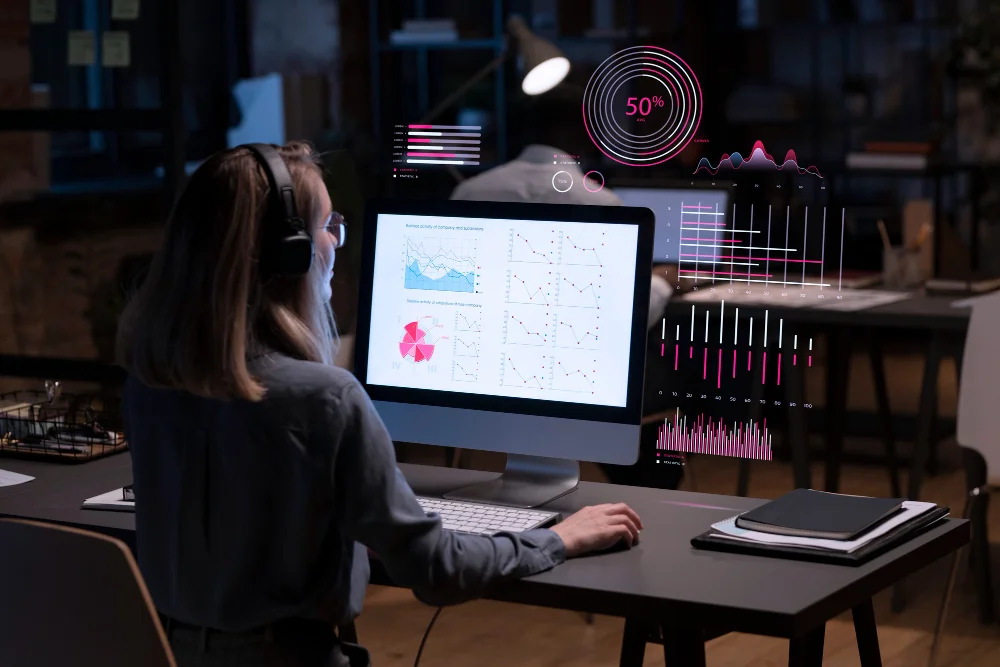Share Posts

Top 10 Software Development Trends for 2025
54
2157
103
Revolutionizing the Tech World: Trends Dominating 2025 and Beyond
The world of technology is now set for a significant upgrade. Groundbreaking inventions will transform industries and the global economy. The year 2025 promises to unleash innovation unprecedented in history- a more efficient, secure, and interconnected future; from totally decentralized systems to the next generation of smarter, connected devices. More than ever before, businesses and individuals need to be ready for the bold move ahead with the ongoing trends. The blog discusses the most important latest tech trends shaping and going to continue to dominate the landscape in 2025 and beyond.
Software Development Trends Not To Ignore In 2025
AI: The Brain Behind the Tech
Artificial Intelligence is one of the vital elements in the process of transformation that has a seat in diverse industries and conjoins the global economy through major shifts. AI will support in auto-generation of codes in the software development sector, give real-time suggestions, and encourage programmers to create more efficient and error-free code. GitHub Copilot-like solutions will become more conventional, leading to faster development cycles.
AI-based technology will be further utilized in testing by the automatic discovery of bugs, security issues, and weaknesses, rendering the software to be more resilient and reliable. There would be intelligent systems that refactor code, optimize performance, and make sure the scalability is also improved. AI’s presence in 2025 will be deeply felt, propelling technology to an unprecedented level and reshaping the industrial landscape.
Cloud Computing: Beyond the Horizon
In 2025, cloud computing will be the most important part of technology infrastructures, expanding horizons and working towards scaling businesses. The more companies adopt a multi-cloud or hybrid cloud approach, the more the demand for integrated and cohesive management of the cloud environments will increase. Services such as the cloud will also change in their existence and will require minimum input with the highest output due to AI, machine learning, and automation of processes.
There will be several advancements such as an increased focus on cloud-native services, microservices, and containerization that will enhance faster and easier deployments. By 2025, moreover, the cloud will not only be for computing and storage; rather it will act as a building block for interconnected systems that interact and help conduct data analysis and make decisions.
Blockchain: Redefining Trust
Blockchain technology usually associated with cryptocurrencies, will core framework for digital trust in 2025 and beyond. Besides finance, blockchain will be the basis for the broad spectrum of applications such as supply chain clarity, digital identity, and secure elections. Its ability to establish decentralized, immutable records will greatly change the industry's traditional mindset where trust, data integrity, and accountability are indispensable.
Smart contracts will be the standard tool for automated agreements and processes so there will be less fraud and the sectors, will become more efficient in areas such as healthcare, legal services, and real estate. The interoperability of different blockchain systems will drive the creation of a more connected and secured digital ecosystem, and thus users are capable of transferring assets, information, and even reputation over different platforms with complete confidence.
Microservices: Building Scalable Systems
The microservices architecture will be the most used pattern in building scalable and maintainable systems in 2025. Through the division of large, monolithic applications into smaller units that can be independently deployed, businesses can gain agility and flexibility, shorten development time, and make the systems resilient to failure. As a microservice is handled by an autonomous team of developers and testers who can move fast in a rapidly changing environment, it becomes a huge advantage.
The increase in the utilization of technologies, like Docker and Kubernetes, that aid in the containerization process will continue to support this trend, thus making it more manageable and orchestrated at scale. In 2025, businesses will use microservices not only to make application development faster, but also to step up the security, enable the pipelines of CI/CD, and practice innovation by rushing through the multidisciplinary methods in no time.
Web3: Decentralized Future
Web3 will represent the next frontier in the evolution of the internet, the decentralized technologies like blockchain, smart contracts, and distributed networks will be the backbone for a more open and user-based web. Web3 will be the medium through which individuals will reclaim their privacy, digital assets, and online identities, with such powers enabling their governing starting in 2025. Instead of concentrating on centralized platforms, users will be entitled to direct interaction with decentralized applications (dApps), participation in decentralized finance (DeFi), and possession of a part of the internet by tokenized ownership.
At the same time, Web3 will bring in creators and consumers from industries like finance, entertainment, and social media, allowing them to make the Internet a more democratic and transparent space. In the future, Web3 could become the default model for how we interact with online services, shifting away from a handful of centralized corporations to a more decentralized, community-driven ecosystem.
Low Code/No-Code: Revolutionizing Application Development
By 2025, low-code and no-code platforms will continue to revolutionize the landscape of software development, making it the place where even non-technical users can easily create complex applications without having to write one line of code. That's the democratization of development-building apps, automating workflows, and customizing solutions all on your business users, marketers, subject matter experts, and so on.
Developers will be freed up from tasks that consist mainly of repetitive code generation and can instead focus on more complex challenges. Expect AI-powered tools that lend support in every aspect of design to backend integration on low-code/no-code platforms to make the app development process much smoother. As this trend continues to rise, it is going to bridge gaps between business needs and IT capabilities, therefore, accelerating digital transformation across industries.
5G Technology: Speeding Ahead
5G technology will be fully integrated into everyday life by 2025, thus bringing the advantages of high speeds, low latency, and amazing connectivity to the digital world. The influence of it will be felt in industries ranging from healthcare to entertainment, thus making it possible for such inventions as remote surgery, real-time augmented reality (AR), and ultra-high-definition video streaming. In this way, IoT devices will be much more commanding and allow for smart city development, autonomous cars, and more efficient supply chain management.
The low latency of 5G will lead to real-time data processing, an essential element for faster decision-making and automation of industries like manufacturing, logistics, and finance. With the expansion of 5g worldwide, the technology landscape would also move to edge computing, where customers can get real data processing with the minimum delay and improvement of speed. Through 2025, 5G will not only be the tool for gaining access to fast internet but will be the foundation of the new era of interconnectedness and innovation.
IoT: Weaving a Connected World
The Internet of Things (IoT) market will be filled with millions of new devices, causing common objects to turn into smart gadgets that can talk to each other and the cloud by 2025. IoT will bring about new levels of automation and intelligence in all these devices, such as home appliances or industrial machinery, with billions of them joining the network. IoT will facilitate supply chain efficiency and energy usage optimization, and as a result, cities will become smarter through sensors and data analytics.
One of the core issues will be dealing with the extremely large amount of data that is produced by IoT devices. Also, it will be essential to ensure that these devices are secure and interoperable. By 2025, IoT will be a core of both business and consumer life adding the elements of more connectivity, flexibility, and efficiency into society.
Edge Computing: Bringing Data Closer
Edge computing will come into greater prominence in 2025, as it will be an essential enabler for processing data where it is generated rather than further upstream in centralized cloud servers. Minimizing the distance that data has to travel is essentially what reduces latency and bandwidth requirements, and so finds many applications where real-time data processing is critical, such as in automated vehicles, smart cities, and automation in industries.
With the exponentially expanding IoT device base, the data at the edge will grow by leaps and bounds and require immediate localized processing and analysis. Edge computing will reduce the load on centralized cloud systems and help utilize resources more effectively for a higher number of applications and scalability will be considered as the critical factor. Businesses implementing the edge will fasten insights and response times across various manufacturing, healthcare, and logistics industries.
DevSecOps: Security at Every Step
In 2025, DevSecOps will be completely integrated into the development lifecycle, so it won't be some adjunct or add-on capability but an essential part of the development process. Security will no longer be an afterthought; it becomes a continuous process. Cyber threats will continue to increase in sophistication, and organizations will begin using automated security testing, code analysis, and detection of threats with the intent of identifying vulnerabilities earlier in the development process.
Bringing security in every stage of the CI/CD pipeline, from code writing to deployment through DevSecOps, would make patching vulnerabilities, compliance enforcement, and risk mitigation easier. Tools for DevSecOps with capabilities in AI and machine learning will act not only on recognized threats but also predict and prevent possible security breaches before they happen. This proactive approach would help businesses have a secure, resilient infrastructure supporting rapid development cycles and innovation.
Augmented Reality: Enhancing Reality
Augmented reality (AR) will play a key role in transforming such fields as retail, education, entertainment, and healthcare by 2025. AR will show a great feeling of a combination of reality and virtual reality in both physical and digital worlds that users will be able to experience through their immediate environment. In retail, AR allows customers, for example, to virtually try on clothes, see how a sofa looks in the apartment, or get personal recommendations based on the current data.
In the case of education, it will allow students to tailor their own authentic experiences like interactive objects, virtual merger games, and virtual tours. Doctors will put AR in use for operations, diagnostics, and training, while in the entertainment industry, AR will find its way to creating interactive gaming and live performance experiences. As the use of AR proliferates across mobile devices, eyewear, and wearables, the distinction between the real and virtual worlds will diminish, thereby opening immense creative, productivity, and entertainment possibilities.
Cyber Security: Defending the Digital Realm
As the cyber threat landscape advances and becomes more complex, the role of cybersecurity will take precedence by 2025. Organizations will need to approach network, data, and user protection in a dynamic, multi-layered, and proactive way against sophisticated threats like ransomware, phishing, and zero-day attacks. AI and machine learning will be the de facto driver for automating the detection of threats, analyzing huge data sets for suspicious behavior, and responding to breaches in real-time.
By employing zero-trust architecture, which is the concept that every request could be malicious, industries will be able to ensure that access controls, identity verification, and encryption are being properly implemented across all levels. With the increased use of cloud computing, IoT, and remote work, enterprises should become more robust in terms of their security systems by using improved encryption techniques, multi-factor authentication, and continuous monitoring to protect against newly developed threats.
Progressive Web Apps: The Future of Apps
Progressive Web Apps are set to be the next frontier in mobile and web app development, thus presenting the smart solutions the two areas have offered till now. By 2025, PWAs will be a regular means of delivering super-fast, responsive, and trustworthy applications across every gadget. PWAs are essentially web apps that act as if they are native apps via the browser without the need for customers to download the app through browser or app store platforms. These apps are of low size, faster too, and are suitable for offline operations, offering more degree of flexibility in addition to the traditional apps' advantages such as loading time.
PWAs for companies diminish the difficulties and expense of app creation and yet, the customer comes back and retains all the while. Be it online purchasing, socializing, or business productivity tools, PWAs would take captive the mobile environment by bringing the users across the platforms without any necessity for them to download and upgrade.
Conclusion
Emerging technologies will redefine the way we work, interact, and innovate in society as we enter 2025. Technologies such as AI, blockchain, IoT, and 5G will progress the functionality of smarter and more efficient systems across all industries. The future is all about elevated connectivity, decentralization, and automation. This decade will be key for success in the changing tech-driven world. The coming decade promises a life that will change the way we experience technology in our everyday lives.
Is your business ready for the future? Contact Maticz, a leading software development company, today to see how you can leverage AI, blockchain, and other emerging technologies to stay ahead of the competition. Maticz’s expert team will help you guide forward through this wave of evolving tech. Let's build a smarter future together!
Tap Into the Future
The latest insights, posts, and project updates - straight to your inbox.




